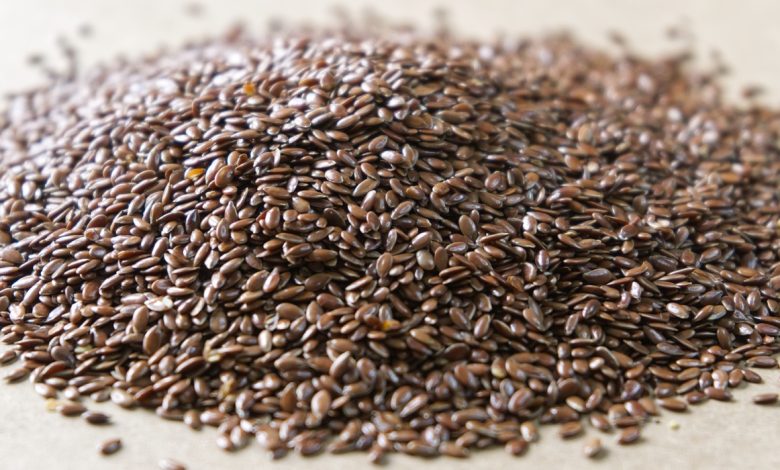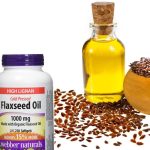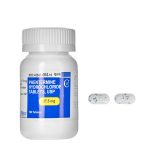Can Flaxseed Cause Breast Cancer? 3 Flaxseed Cancer Warnings

Flaxseed, also known as linseed, is the seed of the flax plant (Linum usitatissimum). It is a small, brown, or golden seed that has gained popularity due to its potential health benefits. Flaxseed is rich in several important nutrients, including omega-3 fatty acids, dietary fiber, and lignans. Omega-3 fatty acids are a type of healthy fat that can help reduce inflammation and promote heart health. Dietary fiber is essential for digestive health and can help regulate bowel movements.
People often consume flaxseed in the ground or milled form, as the outer shell of the seed is difficult for the body to break down, and grinding the seeds enhances their digestibility and nutrient absorption. Flaxseed has been studied for its potential health benefits, and some research suggests that it may have various positive effects on human health. These potential benefits include:
1. Heart health: Flaxseed’s high omega-3 fatty acid content may help reduce the risk of heart disease by lowering blood pressure, improving cholesterol levels, and reducing inflammation.
2. Digestive health: The fiber in flaxseed can promote regular bowel movements and help alleviate constipation. It may also have a prebiotic effect, nourishing beneficial gut bacteria.
3. Hormonal balance: The lignans in flaxseed are phytoestrogens that may have a balancing effect on hormone levels in the body. They may help alleviate symptoms of menopause and have potential protective effects against hormone-related cancers.
4. Anti-inflammatory effects: Flaxseed’s omega-3 fatty acids and lignans have been associated with reduced inflammation, which may benefit conditions like arthritis, asthma, and certain autoimmune disorders.
5. Potential anticancer properties: Some studies suggest that flaxseed lignans may have anticancer effects. However, more research is needed to understand the extent of these effects.
It’s important to note that while flaxseed has potential health benefits, it should not be considered a cure-all. It is best to incorporate flaxseed as part of a balanced diet that includes a variety of nutrient-rich foods. As with any dietary change or supplementation, it’s always a good idea to consult with a healthcare professional, especially if you have any underlying health conditions or are taking medications.
Can flaxseed cause breast cancer?
There is currently no conclusive scientific evidence to suggest that flaxseed causes breast cancer. In fact, some studies have suggested that flaxseed may have protective effects, particularly in relation to breast and prostate cancers.
However, research on flaxseed and its potential role in cancer prevention is currently inconclusive and limited. Many studies conducted so far have been small in scale and of short duration. For instance, in a month-long trial involving approximately 30 post-menopausal women with newly diagnosed breast cancer, daily consumption of flaxseed was found to reduce signs of cancer cell growth. Similarly, several studies involving healthy women consuming flaxseed daily reported a decrease in estrogen levels or a shift towards a relatively inactive form of estrogen. This outcome resulted in less estrogen available to promote breast cancer growth. However, there is variability among studies, which may be influenced by individual hormonal differences, overall diet, and genetic factors.
Regarding prostate cancer risk, population studies have not provided clear evidence of the impact of alpha-linolenic acid (ALA) found in flaxseed. However, recent comprehensive analyses suggest that overall, there is no significant effect. In a study involving men with prostate cancer, those who consumed flaxseed, followed a low-fat diet, or implemented both strategies for about 30 days prior to surgery experienced a reduction in cancer cell growth compared to a control group. The combination of consuming flaxseed and following a low-fat diet yielded the most favorable results.
It is important to note that these findings are based on limited research, and further studies are necessary to establish a clearer understanding of the potential effects of flaxseed on cancer prevention. As always, it is advisable to consult with a healthcare professional for personalized advice, especially if you have specific health concerns or are undergoing treatment for cancer.
How Flaxseed May Protect Against Breast Cancer
Flaxseed contains compounds called lignans, which are phytoestrogens. Phytoestrogens are plant compounds that have a similar structure to the hormone estrogen. They can bind to estrogen receptors in the body and may have both estrogenic and anti-estrogenic effects.
Some studies have shown that lignans from flaxseed may help reduce the risk of breast cancer. They have been found to have anti-inflammatory and antioxidant properties, as well as potential anti-cancer effects.
Studies have shown that women who consumed a muffin containing flaxseed showed promising results in relation to their breast cancer. These included a decrease in the proliferation of tumor cells, a reduction in the expression of c-erB2 (HER2), which is an oncogene associated with the development and progression of breast cancer, and an increase in cell apoptosis (programmed cell death). These findings suggest that incorporating flaxseed into the diet may have potential benefits in terms of breast cancer management.
However, more research is needed to fully understand the mechanisms and potential benefits of flaxseed in relation to breast cancer.
It’s important to note that breast cancer is a complex disease with multiple risk factors, and it is unlikely that a single food item, such as flaxseed, would be solely responsible for causing or preventing breast cancer.
Flaxseed and Colon Cancer
Research on the effects of flaxseed specifically on colon cancer is still limited, and the available studies have produced mixed results. While some studies suggest potential benefits, more research is needed to draw definitive conclusions.
Some studies have explored the impact of flaxseed on colon cancer cells in laboratory settings or animal models. These studies have shown that components of flaxseed, such as lignans and omega-3 fatty acids, may exhibit anti-inflammatory and antioxidant properties, which could potentially help reduce the risk of colon cancer development.
However, when it comes to human studies, the evidence is less clear. Some clinical trials have reported positive effects of flaxseed on certain markers associated with colon cancer risks, such as reducing inflammation and oxidative stress. Other studies, however, have not found significant effects, one study concluded that flaxseed and its bioactive components are associated with a decreased risk of colorectal cancer incidence
It’s important to note that flaxseed should not be considered as a standalone treatment for colon cancer. If you have colon cancer or are at risk, it’s crucial to follow the advice and treatment plans provided by your healthcare professional. They can provide personalized guidance based on your specific condition and recommend appropriate dietary approaches, which may include incorporating flaxseed or other beneficial foods into your diet.
Flaxseed and Lung Cancer
The research on the specific effects of flaxseed on lung cancer is also limited, and there is not enough evidence to establish a direct relationship between flaxseed consumption and lung cancer prevention or treatment.
Flaxseed contains various bioactive compounds, including lignans and omega-3 fatty acids, which have been studied for their potential anti-cancer properties in different types of cancer. However, the majority of research on flaxseed and cancer has focused on breast and prostate cancers, while studies specifically examining its effects on lung cancer are scarce.
The findings from one study indicate that the consumption of 10% flaxseed may help reduce the occurrence of lung tumor development. This reduction is believed to occur through the inhibition of abnormal activation of AKT, ERK, and JNK signaling molecules. These molecules play a significant role in promoting cancer cell survival and proliferation. Therefore, incorporating flaxseed into the diet shows potential as a strategy to inhibit these signaling pathways and potentially reduce the risk of lung cancer development.
While flaxseed’s components, such as lignans, have shown some promising results in laboratory and animal studies regarding lung cancer, it is essential to understand that these findings do not necessarily translate directly to human clinical outcomes.
If you have lung cancer or are at risk, it is crucial to follow the recommendations and treatment plans provided by your healthcare professional. They can provide personalized guidance based on your specific condition and recommend appropriate dietary approaches that may include a well-rounded, balanced diet, which can incorporate a variety of nutrient-rich foods, including flaxseed. However, it is important to note that flaxseed should not be considered a substitute for conventional lung cancer treatments.
How do you use flaxseed for cancer?
Flaxseed is not a standalone treatment for cancer, but it may have potential benefits when incorporated as part of a balanced diet and overall cancer management plan. Here are some ways you can use flaxseed:
1. Ground Flaxseed: Flaxseed is most beneficial when consumed in ground or milled form, as the body has difficulty digesting whole seeds. Grinding the seeds helps enhance their nutrient absorption. You can purchase pre-ground flaxseed or grind them yourself using a coffee grinder or food processor. Store ground flaxseed in an airtight container in the refrigerator to maintain freshness.
2. Add to Foods: You can add ground flaxseed to various foods to increase their nutritional value. Some suggestions include:
• Smoothies: Sprinkle a tablespoon of ground flaxseed into your favorite smoothie recipe.
• Yogurt or Oatmeal: Mix ground flaxseed into yogurt or sprinkle it over oatmeal or cereal.
• Baking: Incorporate ground flaxseed into homemade baked goods like muffins, bread, or pancakes. It can be used as an egg substitute by mixing one tablespoon of ground flaxseed with three tablespoons of water for each egg in the recipe.
3. Flaxseed Oil: Flaxseed oil is another option, but it does not contain the beneficial fiber and lignans found in whole seeds. It is a good source of omega-3 fatty acids. However, it should not be used for cooking at high temperatures as it has a low smoke point. Instead, use flaxseed oil as a salad dressing or drizzle it over cooked vegetables.
4. Consult a Healthcare Professional: If you are considering using flaxseed as part of your cancer management plan, it is important to consult with your healthcare professional or a registered dietitian. They can provide personalized guidance and help determine the appropriate amount and frequency of flaxseed consumption based on your individual needs and treatment plan.
Remember, while flaxseed may have potential health benefits, it should not replace conventional cancer treatments. It is important to follow your healthcare professional’s recommendations and integrate flaxseed into a comprehensive approach to cancer management that includes medical care, a balanced diet, physical activity, and emotional support.
When should flaxseed be avoided?
Flaxseed is generally safe for most people when consumed in moderation. However, there are a few situations where flaxseed should be avoided or used with caution:
1. Allergy or sensitivity: Some individuals may have an allergic reaction or sensitivity to flaxseed. If you experience symptoms such as hives, itching, swelling, difficulty breathing, or digestive issues after consuming flaxseed, discontinue its use and consult a healthcare professional.
2. Intestinal obstruction: Flaxseed is high in fiber, and consuming large amounts without sufficient liquid intake can potentially cause intestinal blockages or obstructions. It is important to drink an adequate amount of water or fluids when consuming flaxseed to ensure proper digestion and avoid any complications, especially for individuals with a history of gastrointestinal disorders.
3. Hormone-sensitive conditions: Flaxseed contains phytoestrogens, which are plant compounds that can have weak estrogen-like effects in the body. If you have a hormone-sensitive condition, such as estrogen receptor-positive breast cancer or endometriosis, it is advisable to consult with a healthcare professional before incorporating flaxseed into your diet. They can provide guidance based on your specific condition.
4. Blood-thinning medications: Flaxseed contains omega-3 fatty acids, which can have mild antiplatelet effects, meaning they can potentially inhibit blood clotting. If you are taking blood-thinning medications, such as warfarin or aspirin, it is important to speak with your healthcare professional before adding flaxseed to your diet. They can provide guidance on the appropriate intake and monitor any potential interactions.
5. Pregnancy and breastfeeding: Flaxseed is generally considered safe during pregnancy and breastfeeding when consumed in moderation as part of a balanced diet. However, it is always recommended to consult with a healthcare professional for personalized advice, as they can provide guidance based on your specific circumstances.
As with any dietary change or supplementation, it is best to consult with a healthcare professional, especially if you have any underlying health conditions or are taking medications, to ensure that incorporating flaxseed is safe and appropriate for you.





